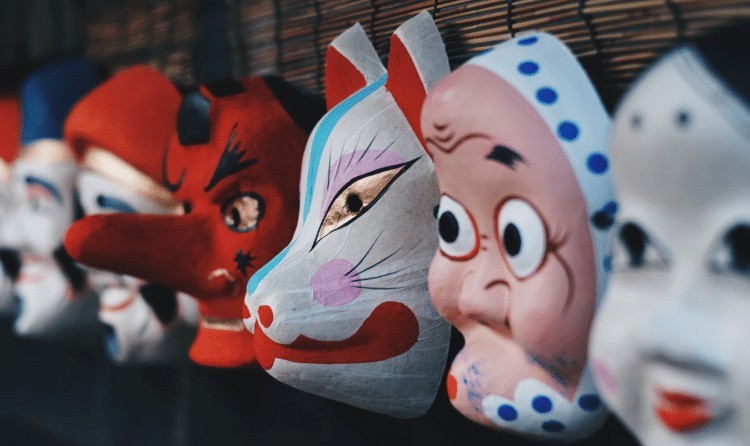In Japan it's easy to survive and face everyday situations using a few basic words and phrases. This is one of the main reasons why most Brazilians who live in Japan do not speak fluent or even intermediate Japanese. With that in mind, we made this article to help you disguise and pretend to be fluent in Japanese.
The purpose of this article is not to deceive anyone, just to disguise your years of study and procrastination that have not taught you how to hold a conversation with people. This happens to many students of Japanese and other languages. They study day and night, learn thousands of words, verbs and grammatical expressions, but when it comes to talking they simply fail.
Achieving fluency in Japanese requires time and a lot of dedication and immersion with Japanese to train your conversation. Some people are afraid to talk to Japanese people for fear of making mistakes and not speaking properly. The tips here will help you to disguise and pretend to understand what is happening around you.

Others need to quickly learn a few words to give speeches or perform in Japan. Many celebrities learn even a phrase in their native language to speak to fans. Some things like accent and informal words are important for these and other occasions.
And don't be fooled just because a Japanese said good at Japanese for you. This expression is commonly heard by anyone who speaks a word in Japanese.
Remembering that don't try to pretend to speak Japanese without knowing anything about the language, you need at least one basic japanese course to pretend to be fluent.
Índice de Conteúdo
Expressions to pretend to understand Japanese
The first step to showing that you know Japanese is to learn expressions that are suitable for a variety of occasions. In addition to yes and no, you should learn a variety of words to make your Japanese sound more natural and informal. Below are some confirmation and deny alternatives:
- ない - nai - a negation used at the end of verbs;
- 違う - chigau - wrong, different;
- 無理 - muri - impossible;
- だめ - dame - it is not good;
- 出来ない - dekinai - I can't;
- ん - un - equivalent to yes, you are agreeing;
- そう - sou - A confirmation, that's right (used with desu);
- ええ... - ee... – Being a confirmation will depend on the tone, it's like our eee;
- ちょっと - chotto - wait, a little, a minute;
- 大丈夫 - daijoubu - Alright, do not worry;
It is worth remembering that the Japanese avoid denying things to a person as much as possible. They always use excuses or some alternatives to avoid saying no. If you are going to deny or reject something, try to put it off until tomorrow, talk sumimasen and make up an excuse.
If you feel isolated or need to say something - あの - Ano can be used as a hey, to get the person's attention;

Tips to disguise your Japanese
Avoid using a simple arigatou to to thank, you can try using more informal words like a simple dome. During informal conversations it is also common swallow particles as wo that comes before verbs.
Another tip is to study a lot the endings of Japanese sentences, try not to just stay in desu and masu. You should learn some regional slang to make your conversation more informal and interesting. Our article about gender language offers several options for informal endings to use in your sentences.
Use anata (you) only if you are talking to a stranger. You can use omae or kimi depending on your relationship. Sometimes it is unnecessary to use the word anata in all the sentences you make to the same person.
- Try using the names of things instead of saying kore wa (this);
- Learn local dialect expressions;

How to have a good accent in the Japanese language
Some have difficulty speaking Japanese because of the Portuguese accent. Fortunately, Brazilians have a much greater facility than English-speaking natives. Most Japanese phonemes are similar to Portuguese syllables. Some tips below can help you to have a good accent in Japanese:
Although the Japanese don't put emphasis and accents on words like Portuguese, they do use a tone accent, making homophones like hashi (bridge) and hashi (chopsticks) sound a little different. Perhaps you should listen to these words and try to catch the different tone within them.
Remember to pronounce the phonemes correctly to have a good accent. Some have great difficulty in this, but it is lack of training and preparation. The video below will help you:
The article is still halfway through, but we recommend also reading:
Becoming fluent in the Japanese language
Of course, if you want to speak Japanese, you must really learn it! Pretending to speak Japanese isn't going to work long or short term. Being fluent is a difficult challenge that takes a lot of time. When faking Japanese you should keep the following goals in mind:
- Master all the necessary phrases;
- Learn to build a sentence in Japanese;
- Master basic Japanese grammar;
If you can fulfill these points above you will be successful in a Japanese conversation. We hope these tips will help you to put in the effort and face the shame of speaking Japanese or socializing with Japanese people. So don't be afraid to make mistakes!
Hope you enjoyed the tips in this article! If you liked it, share it with your friends and leave your comments!






